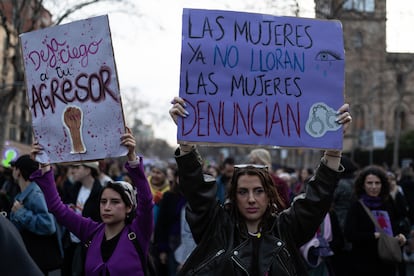A woman who doesn’t cry; a woman who cashes in: A year on from Shakira’s break-up with Piqué
The Colombian singer’s separation from soccer player Gerard Piqué was announced on 4 June 2022. Twelve months on, she has flipped the narrative around the break-up, turning her feelings of hurt into chart-topping success

In a 26-word statement issued exactly a year ago, on 4 June 2022, Shakira and Gerard Piqué announced to the world that they were separating. In three short sentences, the pair said adiós to a 12-year relationship, a shared home in Barcelona, a life together. There were many questions to be answered: questions about the former couple, about their children, about the involvement or not of a third party. The unknowns were soon cleared up, but every chapter in this tale has continued to generate huge interest throughout the 12 months that have now passed since Shakira and Piqué's separation. And it is the Colombian pop star who has taken center stage, emerging as the major beneficiary of the saga – in terms of her family life, her career, and the media narrative.
Shakira and Piqué's story is, at the end of the day, a run-of-the-mill story: after just over a decade together, a couple splits up and goes its separate ways. But there is nothing run-of-the-mill about the two people involved. The fame brought by their high-profile careers; the adoration and hatred they inspire; the people they are surrounded by, from their family to fellow stars, from their lawyers to the former soccer player’s new girlfriend; and, of course, their extreme wealth. These are all factors that make this an extraordinary tale, one that the public tends to view through a prism of ‘good vs bad.’ People usually pick a side. As Nuria Labari wrote in EL PAÍS late last year: “Shakira and Piqué's break-up has a symbolic value that transcends plain old gossip. They represent a time in our lives, and identifiable feelings of devastation. Their separation allows us to associate our needs and desires with one of the adversaries. There can be no getting away from this fact: we continue to tell love stories because they help us to understand who we are […]. Their break-up encourages catharsis just as effectively as any Greek tragedy.”
365 days. Precisely a year has passed since Shakira initially emerged as an apparent victim, the recipient of widespread pity, when news came out about her separation from Piqué and his relationship with Clara Chía. Since then, however, the Colombian has become quite the symbol of empowerment, by doing something so complex yet so simple: talking about what has happened. By laying bare her feelings, by sharing her heartbreak in a way that has allowed her to flip the narrative and, for many, emerge as a heroine. “Although the projection of this image as heroine is a double-edge sword, it’s like in the movies,” says Asunción Bernárdez, a professor in journalism at Madrid’s Universidad Complutense, and an expert in communication and gender. “Because she’s rich, she can take the kids with her. She has this heroic appeal that’s reminiscent of a character in a movie. She’s representative of the heroic narrative that we love.”
Having collaborated with Rauw Alejandro on the hit song Te felicito shortly before confirming her separation from Piqué, Shakira then brought out the track Monotonía in October, with the break-up still raw. She appears in the official video with her heart literally ripped out of her chest, passers-by treading on it. If that seemed on the nose, though, it was well and truly outdone by what happened next.
Until early 2023, Shakira had largely kept her counsel about the break-up. Having offered just one interview, she had opted for discretion. In November, the singer had secured what she most wanted: custody of her two sons. She would be taking them to Miami, out of the media glare, and getting on with her career – a career which, she said, had been put on hold because of her relationship with Piqué. Then, on 12 January, Shakira lit the blue-touch paper. She released a collaboration with the Argentinian rapper Bizarrap, a track whose unremarkable title – Bzrp Music Sessions #53 – offered little indication that it would contain a veritable salvo of digs at her ex. “[The diss track] is nothing new,” says Miguel Ángel Bargueño, a music critic, journalist and author. “But she really goes for the jugular. I’d like to know how these songs are created. She comes out and talks about her life, and there’s a whole team of people in the background. If you look at the song’s credits, there are a few other people [in addition to Shakira and Bizarrap, the track’s writers are listed as Francisco Zecca, Kevyn Mauricio Cruz Moreno and Santiago Pablo Exequiel Alvarado]. I don’t know how that creative process unfolds. It’s as if she’s giving an interview to Hello! magazine in song format. It will have had millions of plays, but where the artists really make their money is in live performances. With the series of hits she’s had, she can go out on the road.”
From 26 words in the break-up statement, to 358 in Bzrp Music Sessions #53 – each one more biting than the next. Piqué, Clara Chía, her ex-mother-in-law, her tax troubles, her anger and her tears… It all comes together to create a record-breaking song. Four records, to be precise, including being the most-viewed Latino song in a 24-hour period, and the quickest to 100 million plays on the platform (it’s now up to 560 million). Both records have been certified by Guinness World Records. What’s more, the track threw up a phrase – “Women don’t cry, women cash in” – that became an instant motto for a whole generation of listeners. It could even be seen on placards at International Women’s Day events in March, adapted from its original form to convey a host of other messages.

Songs are normally fictional constructs adorned by touches of the writer’s personal life, but Shakira turned hers into an open letter, a manifesto. She knew the impact it would have. For three days in January, Bzrp Music Sessions #53 was the most popular song on Spotify worldwide. Indeed, on the day it was released, it accrued 14.4 million listens, according to the platform. It also became the center of the conversation. The following week, it was the second-most played song on Spotify (beaten only by Flowers, another track about empowerment and revenge, this time by Miley Cyrus). In February, Bzrp Music Sessions #53 was among the top six in the world; in March, the top 15. It has now been played 645 million times on Spotify.
“A year ago, Shakira’s career wasn’t in the best of places,” Bargueño says. “But she has managed to reinvent herself, by working with younger people and focusing on Latino music, which is in fashion. She collaborated with Bizarrap, with Karol G, with Rauw Alejandro… It’s a bit like what Madonna has always done – join forces with artists who are fresh and taking the music world by storm. She has found a way to reinvigorate herself as an artist; in recent times, her music had been in need of an update. She didn’t know what direction to go in, and she has found her way forward. I’d put this enormous success down to the fact that it’s a very funny song, to the point where Los Morancos, two well-known Spanish comedians who often do parodies of successful songs, couldn’t beat it.”

In Bzrp Music Sessions #53, the established narrative of the major hit song combines with the narrative of the events in Shakira’s relationship with Piqué. And, in turn, her work has intertwined with the former couple’s story. At one point, Piqué briefly discussed being the subject of a diss track, declaring that his only concern was the couple’s children. His message to his former partner was clear: what’s more important, your sons or your Spotify ranking? Nevertheless, Shakira has emerged as the clear winner of the media battle. She went from a woman who appeared to have given it all up for love – professional success, her country, her life – to one who served up headline quotes such as: “Now I feel complete, because I feel like I only depend on myself and, what’s more, I have two kids who depend on me, so I have to be stronger than a lion.” Or: “I didn’t know I could be so strong – I’d always thought I was more of a fragile person. I have all the tools I need.” Both Shakira’s record label and her legal team declined requests to talk about her, and that appears to be the norm: those who know her say it is she who decides “what goes and what doesn’t go.” It’s clear that she has taken charge of her own story.
According to Bernárdez, Shakira’s attitude “helps women to have a role model for empowered feminism, and reminds young females that, aside from feelings, there is a material, real world out there – she reminds them that we don’t want to stay at home crying.” However, the academic also warns that feminism is about eradicating deep-seated social inequalities, about going one step further. “Above and beyond fighting and fighting, and continually escalating the attacks, feminism’s task is to dismantle the structures that create differences [in relationships between men and women],” she explains. “It’s not about women doing the same [as men], it’s about empowering them and undoing the established pattern in couples whereby one member goes out into the world and moves forward, and the other, or the woman, has to focus more on home life. The most complex question to ask is whether this case helps to dismantle such patterns of inequality or whether, deep down, it’s not as ground-breaking as it might seem.” Bernárdez continues: “Has Shakira’s experience really been so ground-breaking? What we need to do, perhaps, is get away from the guidelines for love that we’ve always followed. Empowering women is great, but let’s not forget the ultimate goal: equality. And equality is all about dismantling the notion of the couple as we know it, doing away with the stereotypes. It’s the same old debate: perhaps we should consider another type of family, another type of relationship. But these are much more complex processes.”
Sign up for our weekly newsletter to get more English-language news coverage from EL PAÍS USA Edition
Tu suscripción se está usando en otro dispositivo
¿Quieres añadir otro usuario a tu suscripción?
Si continúas leyendo en este dispositivo, no se podrá leer en el otro.
FlechaTu suscripción se está usando en otro dispositivo y solo puedes acceder a EL PAÍS desde un dispositivo a la vez.
Si quieres compartir tu cuenta, cambia tu suscripción a la modalidad Premium, así podrás añadir otro usuario. Cada uno accederá con su propia cuenta de email, lo que os permitirá personalizar vuestra experiencia en EL PAÍS.
¿Tienes una suscripción de empresa? Accede aquí para contratar más cuentas.
En el caso de no saber quién está usando tu cuenta, te recomendamos cambiar tu contraseña aquí.
Si decides continuar compartiendo tu cuenta, este mensaje se mostrará en tu dispositivo y en el de la otra persona que está usando tu cuenta de forma indefinida, afectando a tu experiencia de lectura. Puedes consultar aquí los términos y condiciones de la suscripción digital.









































